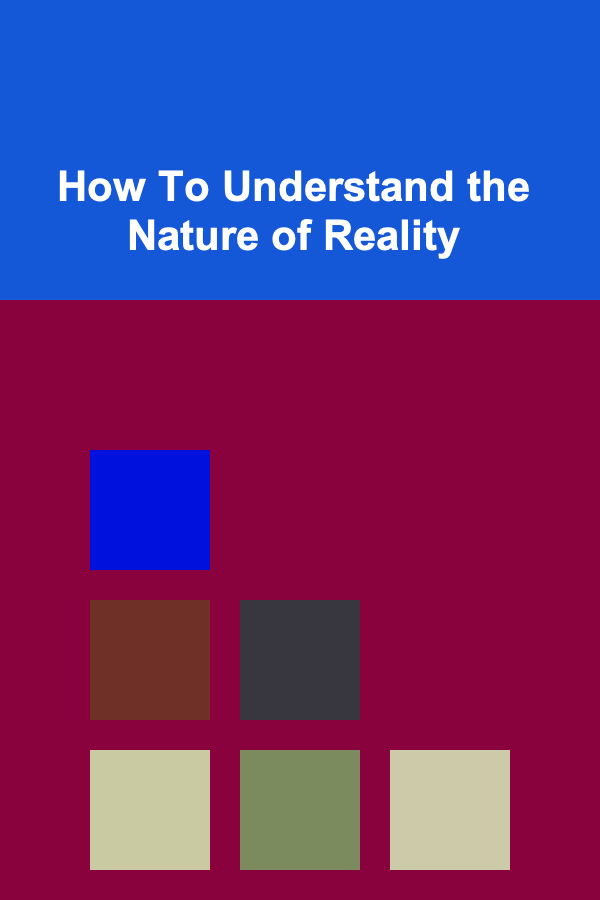
How To Understand the Nature of Reality
ebook include PDF & Audio bundle (Micro Guide)
$12.99$8.99
Limited Time Offer! Order within the next:

Understanding the nature of reality is one of the most profound and challenging quests in both philosophy and science. For centuries, thinkers from various disciplines have sought to explain what "reality" truly is. Whether it's the physical world around us, the mind's perception of it, or something beyond our current comprehension, reality is a multifaceted concept that lies at the heart of human inquiry. The pursuit of understanding reality touches on deep philosophical questions, scientific investigation, and even spiritual exploration.
In this article, we will explore the various ways in which humans approach the question of what constitutes reality. We will dive into philosophical perspectives, scientific discoveries, and modern theories, drawing from diverse schools of thought such as metaphysics, epistemology, quantum mechanics, and even psychology and consciousness studies. We aim to give a comprehensive and deep understanding of how we can approach the nature of reality.
Defining Reality
Before we embark on a journey to understand reality, it's important to define what we mean by "reality." Reality, in a broad sense, refers to the state of things as they actually exist, as opposed to how they may appear or how we may interpret them. It is the totality of everything that is real, whether it is physical, mental, or even conceptual. In this sense, reality can be divided into several dimensions:
- Objective Reality: The physical world that exists independent of human perception. This includes everything from the stars in the sky to the molecules in a rock.
- Subjective Reality: The personal, mental, or psychological experiences of individuals. This is how we perceive the world based on our senses, thoughts, and emotions.
- Ultimate or Fundamental Reality: The deeper essence of reality that might exist beyond the material world. This could be the ultimate nature of existence itself, whether it is rooted in the laws of physics, a higher form of consciousness, or something beyond human comprehension.
Reality, therefore, encompasses more than just the material world; it also involves the ways in which we interpret and interact with the world around us.
Philosophical Approaches to Reality
Philosophers have long debated the nature of reality, and different schools of thought have emerged throughout history. Some of the most influential ideas come from metaphysics, the branch of philosophy concerned with the fundamental nature of reality.
The Idealist Perspective
One of the earliest and most enduring views on reality is idealism, which argues that reality is fundamentally mental or immaterial. According to idealist philosophers like George Berkeley, the physical world does not exist independently of the mind. Instead, reality is composed of ideas or perceptions in the minds of conscious beings.
In this view, the external world is simply the way our minds perceive it. Berkeley famously stated, "esse est percipi" (to be is to be perceived), meaning that things exist only insofar as they are perceived by a conscious observer.
Idealism raises intriguing questions about the nature of existence---if the material world does not exist outside of our perceptions, what, then, is its true nature? Is it simply an illusion or a projection of our consciousness?
The Realist Perspective
In contrast to idealism, realism holds that the world exists independently of our perceptions. According to this view, there is an objective reality that exists whether or not we observe it. Philosophers such as Aristotle and Immanuel Kant were proponents of this view, with Kant proposing that while we may never know reality as it is in itself (noumenon), we can know reality as it appears to us (phenomenon).
Realism suggests that there are objective truths about the world that exist independently of our minds. These truths can be discovered through observation, reasoning, and scientific inquiry. The belief in an objective, external reality is deeply rooted in the scientific method and the assumption that the world behaves according to predictable laws.
The Phenomenological Approach
The phenomenological approach, pioneered by Edmund Husserl and later expanded by philosophers like Martin Heidegger and Maurice Merleau-Ponty, takes a different approach to understanding reality. Phenomenology emphasizes the subjective experience of reality and focuses on how we experience and interpret the world. For phenomenologists, the nature of reality is intertwined with human consciousness and perception.
In this view, reality is not something that exists separate from us; rather, it is experienced through our perception of the world. Human consciousness shapes how we encounter objects, people, and events. Our experiences are filtered through our senses, thoughts, emotions, and expectations, and this shapes the reality that we live in.
This perspective recognizes the complexity of human experience, arguing that reality is not simply a passive reflection of an objective world but an active process of perception, meaning-making, and interpretation.
The Pragmatist Approach
The pragmatist philosophy, associated with thinkers like William James and John Dewey, offers a more practical take on the nature of reality. Pragmatism emphasizes the importance of how our understanding of reality can be used to solve problems and improve our lives. For pragmatists, truth and reality are not static concepts; they are dynamic and evolving, shaped by human action and experience.
In this view, reality is what works in practice. If a belief or theory helps us navigate the world and achieve our goals, then it can be considered true. Reality, therefore, is not something that is fixed and unchanging, but rather something that is shaped by our interactions with the world and our ability to adapt and learn.
Scientific Approaches to Reality
In addition to philosophical considerations, science has provided profound insights into the nature of reality. The development of physics, biology, and other scientific disciplines has transformed our understanding of the world. Here, we will focus on two scientific areas that have significantly altered our perception of reality: quantum mechanics and neuroscience.
Quantum Mechanics and the Nature of the Physical World
Quantum mechanics is one of the most revolutionary theories in modern physics, and it challenges our classical understanding of reality. According to quantum theory, particles can exist in multiple states at once, and they do not have definite positions until they are observed. This concept is encapsulated in the wave-particle duality, where particles like electrons can behave both like waves and particles depending on how they are measured.
Moreover, quantum mechanics introduces the concept of entanglement, where two particles can become linked in such a way that the state of one particle instantly affects the state of the other, even if they are separated by vast distances. This phenomenon seems to defy classical ideas of space and time and suggests that reality may be interconnected in ways that we do not fully understand.
These findings have profound implications for the nature of reality. They suggest that the world is far more complex and mysterious than we previously thought. Reality, at the quantum level, may not be as solid, deterministic, or predictable as we once believed. Instead, it might be probabilistic, fluid, and interconnected in ways that challenge our everyday experience of the world.
Neuroscience and the Nature of Consciousness
Neuroscience has made significant strides in understanding how the brain processes information and creates our subjective experience of reality. The brain takes in sensory input from the world around us, processes this information, and constructs a mental model of reality. However, this model is not a perfect reflection of the world; it is shaped by our senses, cognitive biases, and past experiences.
The study of consciousness is a key area of interest in neuroscience. Consciousness is our awareness of ourselves and the world, and it plays a central role in how we experience reality. But the exact nature of consciousness remains elusive. Is consciousness merely the result of complex neural activity, or does it represent something deeper---perhaps something that transcends the brain's physical processes?
Recent theories, such as the integrated information theory and global workspace theory, propose that consciousness arises from the brain's ability to integrate information from various neural regions and create a unified experience of reality. However, the subjective nature of consciousness---what it feels like to be conscious---is still a mystery. This raises the question: is the reality we experience solely a product of our minds, or does it have an objective existence independent of us?
The Intersection of Science and Philosophy
As we can see, both philosophy and science offer valuable insights into the nature of reality. While philosophy grapples with the deeper, more abstract questions about existence, perception, and truth, science provides concrete data and theories about the world. Yet, both domains must work together to fully understand reality.
For example, the mind-body problem---a classic philosophical dilemma---has real-world implications for neuroscience. How does the physical brain give rise to subjective consciousness, and how does this shape our perception of reality? Similarly, quantum mechanics challenges our assumptions about the material world and forces us to reconsider the nature of reality at a fundamental level.
The intersection of science and philosophy can also be seen in the study of artificial intelligence and virtual reality. As technology advances, we are increasingly confronted with questions about the nature of simulated realities and the possibility of creating new forms of consciousness. Could a machine ever experience reality as humans do? Can we create realities that are indistinguishable from the physical world? These questions blur the lines between the real and the imagined and raise new challenges for our understanding of reality.
Conclusion
The nature of reality is a multifaceted and elusive concept that has intrigued thinkers for centuries. Whether we approach reality from a philosophical or scientific perspective, it becomes clear that our understanding is far from complete. Reality is not a singular, fixed entity; it is something that exists in multiple layers, from the physical world to the subjective experience of consciousness.
As we continue to explore the depths of quantum mechanics, neuroscience, and the philosophy of mind, we may gain new insights into the fundamental nature of reality. But for now, reality remains one of the greatest mysteries of human existence---one that continues to inspire awe, wonder, and curiosity.

How to Keep Vintage Books Organized and Protected
Read More
How to Organize Your Car with Reusable Bags and Containers
Read More
How to Sell Digital Products Successfully for YouTubers
Read More
How to Start a Passive Income Business with Deep Learning
Read More
How to Use Market Research Skills to Make Money
Read More
How to Understand the Politics of Climate Change
Read MoreOther Products

How to Keep Vintage Books Organized and Protected
Read More
How to Organize Your Car with Reusable Bags and Containers
Read More
How to Sell Digital Products Successfully for YouTubers
Read More
How to Start a Passive Income Business with Deep Learning
Read More
How to Use Market Research Skills to Make Money
Read More